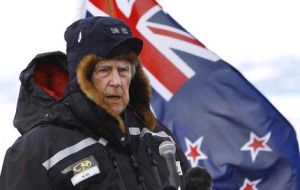MercoPress. South Atlantic News Agency
Nepal/NZ mourn loss of Mount Everest colossus conqueror
 Sir Edmund Hillary at the 50th Anniversary of Scott Base
Sir Edmund Hillary at the 50th Anniversary of Scott Base Nepal, the country of Mount Everest, has been remembering Sir Edmund Hillary, the joint first conqueror of the summit. Sir Edmund died in his native New Zealand, aged 88, after a heart attack.
He continued visiting Nepal regularly until the end of his life, drawn to its communities as much as to its mountains. Lamps have been lit in Nepal in his memory and Buddhist monks and others are offering prayers. Ed Hillary, as he liked to be known, always felt at home in Nepal, and many people especially in the Sherpa community, which is so closely identified with Everest, are now in mourning. Jamling Tenzing Norgay, the son of the man who reached the summit with him, said the New Zealand explorer had remained a very simple and humble man. He said he was a father figure to Sherpas and would be greatly missed. Nepal's tourism minister spoke of his sadness on the death of someone who made huge contributions to the country's social and economic development. Indeed the charity founded by Sir Edmund, the Himalayan Trust, which is now run by local people, has set up nearly 30 schools and two hospitals in the high mountains - work which the late explorer said had satisfied him even more than his mountaineering. At the trust, in Buddhist monasteries and in some of the institutions he founded in the Khumbu region over which Everest towers, lamps were lit in the mountaineer's memory. Buddhist monks are offering prayers with the firm faith that the explorer will be reincarnated into another human life. In New Zealand PM Helen Clark said a state funeral would be held for Sir Edmund, while Queen Elizabeth II said she was "very saddened" by his death. Sir Edmund conquered the peak with Tenzing Norgay on 29 May 1953. The first living New Zealander to appear on a banknote, his health had reportedly been failing since April, when he suffered a fall during a visit to Nepal. Flags at the New Zealand parliament in Wellington and at the Scott Base in Antarctica were at half mast as a mark of respect to the climber. New Zealand's prime minister described him as a "colossus". "The legendary mountaineer, adventurer, and philanthropist is the best-known New Zealander ever to have lived," Ms Clark said in a statement. "But most of all he was a quintessential Kiwi; he was ours - from his craggy appearance to laconic style, to his directness and honesty. All New Zealanders will deeply mourn his passing." The climber was 33 years old when he and Tenzing Norgay become the first men to climb the 8,850m peak. Returning to Everest's South Col camp, he famously greeted another member of the British expedition group with the words: "Well, George, we've knocked the bastard off." After scaling Everest, Sir Edmund led a number of expeditions to the South Pole and devoted his life to helping the ethnic Sherpas of Nepal's Khumbu region. Born in Auckland on 19 July 1919, Sir Edmund began climbing mountains in his native country as a teenager and soon earned renown as an ice climber. By the time he attempted his ascent of Everest in 1953 as part of an expedition led by the British climber, Sir John Hunt, seven previous expeditions to the top of the mountain had failed. After a grueling climb up the southern face, battling the effects of high altitude and bad weather, Sir Edmund and Tenzing Norgay managed to reach the peak at 1130 local time on 29 May. "I continued hacking steps along the ridge and then up a few more to the right... to my great delight I realized we were on top of Mount Everest and that the whole world spread out below us," Sir Edmund said. The two men only stayed on the summit for 15 minutes because they were low on oxygen.




Top Comments
Disclaimer & comment rulesCommenting for this story is now closed.
If you have a Facebook account, become a fan and comment on our Facebook Page!